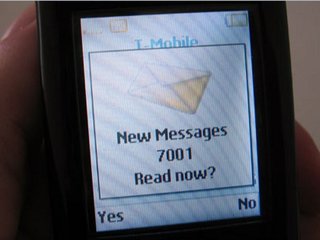DUOS expands AI capabilities to help seniors apply for assistance programs
It will complete and submit forms, and integrate with state benefit systems
Read more...
Because we at VatorNews are well aware of the overwhelming curiosity of our readership concerning all things Finland, here's a report about how a Finnish mobile carrier and one of the first innovators of the text-messaging medium, Sonera, recorded a stark decline in texts on Christmas Eve 2011, the traditionally most popular day to text or call.
In 2011, Sonera customers sent only 8.9 million texts on Christmas Eve, down from the 10.9 million from 2010. DNA, a reportedly more youth-oriented Finnish mobile carrier, also experienced a decrease in text messaging on Christmas Eve, though less drastic, from 5.9 million down to 5.6 million.
Text messaging also declined 14% in Hong Kong on Christmas Day, while in Australia, texting declined 9% throughout 2011, according to the findings of an Australian blogger.
This is not to say texting is quite dead yet. A recent study by the Pew Research Center shows that 75% of mobile users surveyed in 21 countries still send text messages. Also, according to a December report by The Telegraph, less people in the U.K. make holiday greetings via social networks and opt for the slightly more personal call or text message.
However, some are calling these statistics out of Finland and China a portent of things to come, as social networking supplants SMS media, and Web connectivity increasingly moves into the mobile sphere.
Part of this thinking is based on the fact that Finland and China were some of the first markets to adopt texting, and as well are some of the world's most fervent texters. These countries' decline of texting, and assumtions of their transference to Web-based messaging media, has been characterized by Tero Kuttinen, an analyst for M.G.I. Research and a Forbes blogger, as only the first step in a global decline in texting.
Kuttinen predicts that American carriers like AT&T and Verizon will experience a similar trend within the next two years. A report from June 2011 already shows that American mobile carriers are already logging slower growth in text messaging, 10% growth in Q1 down from 16% growth in Q4 2010. This is perhaps not as significant, unless compared to the 116% growth in Q4 2008.
Such figures can be significant to mobile carriers, in that texting can represent a significant percentage of revenue, whereas Web messaging often can function on free apps. But to me, this seems very much a question of the proliferation of smart phones in the average user. Because, yes, why would a mobile user text, when Web messaging is quicker, more reliable, and cheaper?
Another survey by Pew Research back in July 2011 showed that 42% of American cell phone users, and 35 % of American adults, use smart phones. A study by Nielson around the same time showed similar results, that 40% of American mobile users are using smart phones. This Nielsen study also yielded that 40% of mobile operators reported using an Android OS, with iOS coming in second with 28%.
A comScore study from late in August 2011 showed findings similar to the distribution of mobile use between Android and iOS, that 70% of mobile users are on one of the two most popular mobile operating systems.
It will complete and submit forms, and integrate with state benefit systems
Read more...The bill would require a report on how these industries use AI to valuate homes and underwrite loans
Read more...The artists wrote an open letter accusing OpenAI of misleading and using them
Read more...


